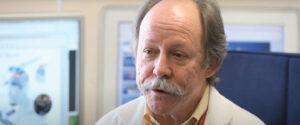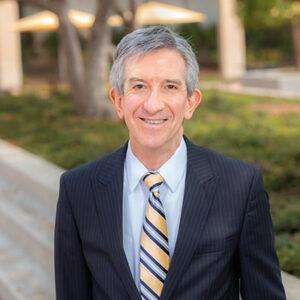Dr. Mark S. George, MD
 In 1995, Dr. Mark George, a South Carolina native, returned to Charleston and built a campus-wide research brain imaging division and the brain stimulation laboratory in the Department of Psychiatry. As an undergraduate student in philosophy at Davidson College, Dr. George began studying the relationship between mind and brain, or brain/behavior relationships. He has continued this interest throughout his career with a focus on using brain imaging and brain stimulation to understand depression and devise new treatments. He received his medical degree from MUSC in 1985, where he continued with dual residencies in both neurology and psychiatry. He is board certified in both areas.Following his residency training he worked for one year (from 1990 to 1991) at the Institute of Neurology, Queen Square, London, England. He then moved to Washington, DC, working in the Intramural National Institute of Mental Health (NIMH).
In 1995, Dr. Mark George, a South Carolina native, returned to Charleston and built a campus-wide research brain imaging division and the brain stimulation laboratory in the Department of Psychiatry. As an undergraduate student in philosophy at Davidson College, Dr. George began studying the relationship between mind and brain, or brain/behavior relationships. He has continued this interest throughout his career with a focus on using brain imaging and brain stimulation to understand depression and devise new treatments. He received his medical degree from MUSC in 1985, where he continued with dual residencies in both neurology and psychiatry. He is board certified in both areas.Following his residency training he worked for one year (from 1990 to 1991) at the Institute of Neurology, Queen Square, London, England. He then moved to Washington, DC, working in the Intramural National Institute of Mental Health (NIMH). - He was one of the first to use functional brain imaging during normal emotions as well as in depression and mania. He has grown the science of brain stimulation, both in terms of how the treatments work in the brain, and in critically evaluating their therapeutic applications, especially in treating depression. He may be unique in being the only living neuroscientist with two FDA approved treatments that stem from their work. Transcranial magnetic stimulation (TMS) was FDA approved for treating depression in October, 2008. In June 1998 at MUSC, he also pioneered another new treatment for resistant depression, vagus nerve stimulation (VNS). This was FDA approved in 2006. Dr. George is a world expert in brain stimulation, and depression, and is the editor-in-chief of a journal he launched with Elsevier in 2008 called, Brain Stimulation: Basic, Translation and Clinical Research in Neuromodulation. He has been continuously funded by NIH and other funding agencies since his fellowships. He has received numerous national and international awards. In 2009 U.S. News and World Report named him one of 14 ‘medical pioneers who are not holding back’.
- He has published over 400 scientific articles or book chapters, and has written or edited six books.
Dr. Andrew Leuchter, MD

Andrew F. Leuchter, MD, is a Professor in the Department of Psychiatry and Biobehavioral Science, Director of the Neuromodulation Division, and a Senior Research Scientist at the Semel Institute for Neuroscience and Human Behavior at UCLA. A graduate of Stanford University, Dr. Leuchter earned his medical degree from Baylor College of Medicine in Houston, Texas. He completed internships in Medicine/Neurology at the Wadsworth Veterans Administration Medical Center and in Geroneuropsychiatry/Neurology at the UCLA Neuropsychiatric Institute, followed by a residency in Psychiatry at the UCLA Neuropsychiatric Institute and a Robert Wood Johnson Fellowship in the UCLA Department of Medicine. He joined the UCLA faculty in 1986.
-
Dr. Leuchter is a Diplomate of the American Board of Electroencephalography and Neurophysiology and a Diplomate in Psychiatry and Neurology with Added Qualifications in Geriatric Psychiatry. He is a member of several professional organizations, including the American Psychiatric Association, American Psychiatric Electrophysiology Association, and the American Medical EEG Association. He has authored over 150 scientific articles on topics including neuromodulation for the treatment of depression, biomarkers to guide treatment of neuropsychiatric illness, and theories of antidepressant action. He also maintains an active clinical practice, specializing in consultation for and care of patients suffering from treatment-resistant depression.
-
An internationally recognized expert on the treatment of mood disorders, Dr. Leuchter’s research focuses on the enhancement of treatment outcomes in depression. He directs the UCLA Transcranial Magnetic Stimulation (TMS) Clinical and Research Service in the Division. Dr. Leuchter leads clinical trials to develop novel neuromodulation technologies for treatment of depression and Post-Traumatic Stress Disorder (PTSD), including synchronized Transcranial Magnetic Stimulation (sTMS) and Trigeminal Nerve Stimulation (TNS). He uses brain-imaging techniques, such as quantitative electroencephalography (qEEG), magnetic resonance imaging (MRI), and positron emission tomography (PET), to examine brain function and predict which treatments are most likely to benefit individual patients. His research program combines clinical trials with neurophysiologic and brain-imaging studies to inform clinical practice in the treatment of depression. As a Board certified electroencephalographer he has unique expertise in development of biomarkers and has shown that brain oscillation patterns can be used to determine highly beneficial and individualized treatment.



